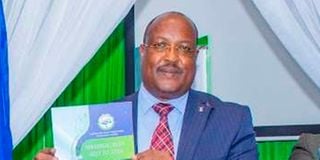Sh1.7bn project at centre of Rift Valley water agency CEO Samuel Oruma's woes

Embattled Central Rift Valley Water Works Development Agency Chief Executive Officer Samuel Oruma.
Sh1.7 billion project is believed to be the cause of Central Rift Valley Water Works Development Agency Chief Executive Officer Samuel Oruma woes.
Documents obtained by Nation.Africa indicate that Eng Oruma allegedly approved change of material in the construction of a water and sanitation system for Bomet–Longisa–Mullot towns, from steel pipes to Glass Reinforced Pipes (GRP).
GRP are not locally available, with the main manufacturer based in Turkey.
On Friday evening, Head of Public Service Felix Koskei asked the board of the agency to suspend Eng. Oruma pending investigations into alleged procurement irregularities.
Dr Koskei in a letter to the chairperson of the board noted that the CEO was still in office despite the gravity of allegations and the quantum of resources under inquiry.
The Bomet–Longisa–Mulot water project will supply water to 216,850 customers in Bomet Central and Chepalungu constituencies and was launched in April 2022 under the China Railway Tenth Engineering Company.
It is funded by the African Development Bank (AfDB) under the Kenya Towns Sustainable Water Supply and Sanitation Programme, with the works being implemented by the Central Rift Valley Water Works Development Agency on behalf of the Lake Victoria South Water Works Development Agency.
Eng. Oruma, in a letter dated Jan 11, 2023, wrote to the project’s team leader Eng. Bernard Ochieng with a proposal by the contractor – China Railway No 10 Engineering Group Ltd – for change of pipe material.
The letter proceeds to note that the engineer in the project had recommended installation of steel pipes be maintained. But Eng. Oruma went on to state that some of the concerns raised in changing to GRP had been fully addressed while citing the benefits in altering the material.
“The main manufacturer is in Turkey with a local agent in Kenya (Sahara GRP Pipe Solutions Ltd) will be continuously engaged during and after project project execution period to offer technical support and trainings,” the letter states.
Cost savings
He stated that the GRP pipes would be delivered to site within two months post approval. He stated that the installation will take a maximum of five months.
He adds that the contractor will procure repair kits for all installed GRP pipe sizes, which will be handed over to the operator after project completion.
“It is further noted that the project will realise a saving of 2.5 per cent of the project cost, with a reduced construction period of nine months which is acceptable as it will accelerate project completion considering the program end date of June 30, 2023,” Eng. Oruma said.
But ASP Company Limited – manufacturer of large diameter steel pipes and fittings – would in a letter to Water Principal Secretary Kiprono Ronoh complain of ‘unprofessional behaviour of China Railway No 10 Engineering Group Ltd”, the contractor.
In the letter dated March 9, 2023, ASP states that the project was tendered with steel pipes as the major material and the contractor was awarded the job on the same basis on January 3, 2022.
The company told the PS that there is very little track record of the use of GRP pipes in Kenya. The company cited the Kerugoya water project, which they said had run into major technical problems for opting for GRP.
“GRP pipes require special handling and proper back fill to support the pipes as GRP does not have the superior strength and properties of steel pipe,” states the letter. There also raised issues with fittings and repairs as there is no local GRP manufacturer.






